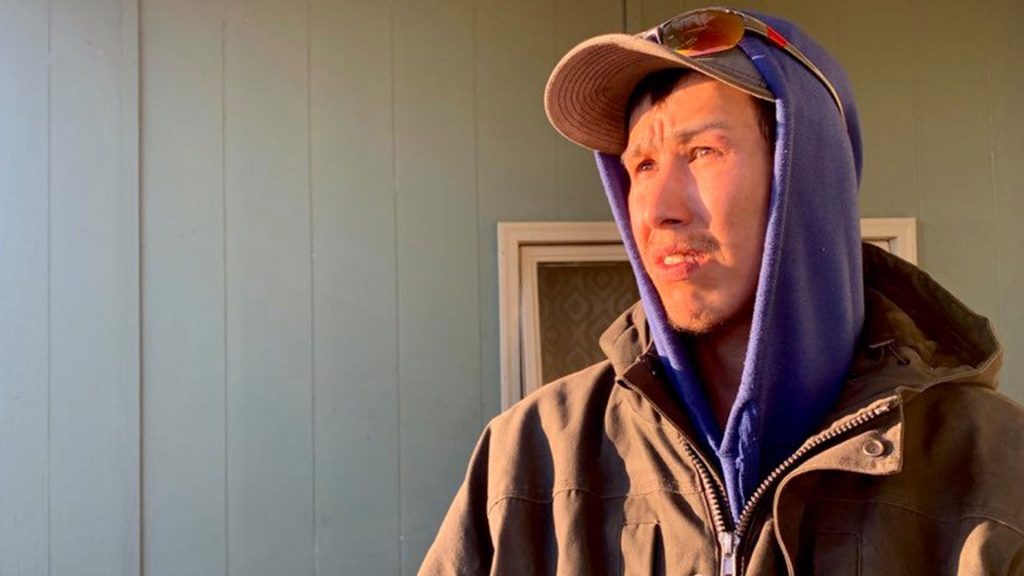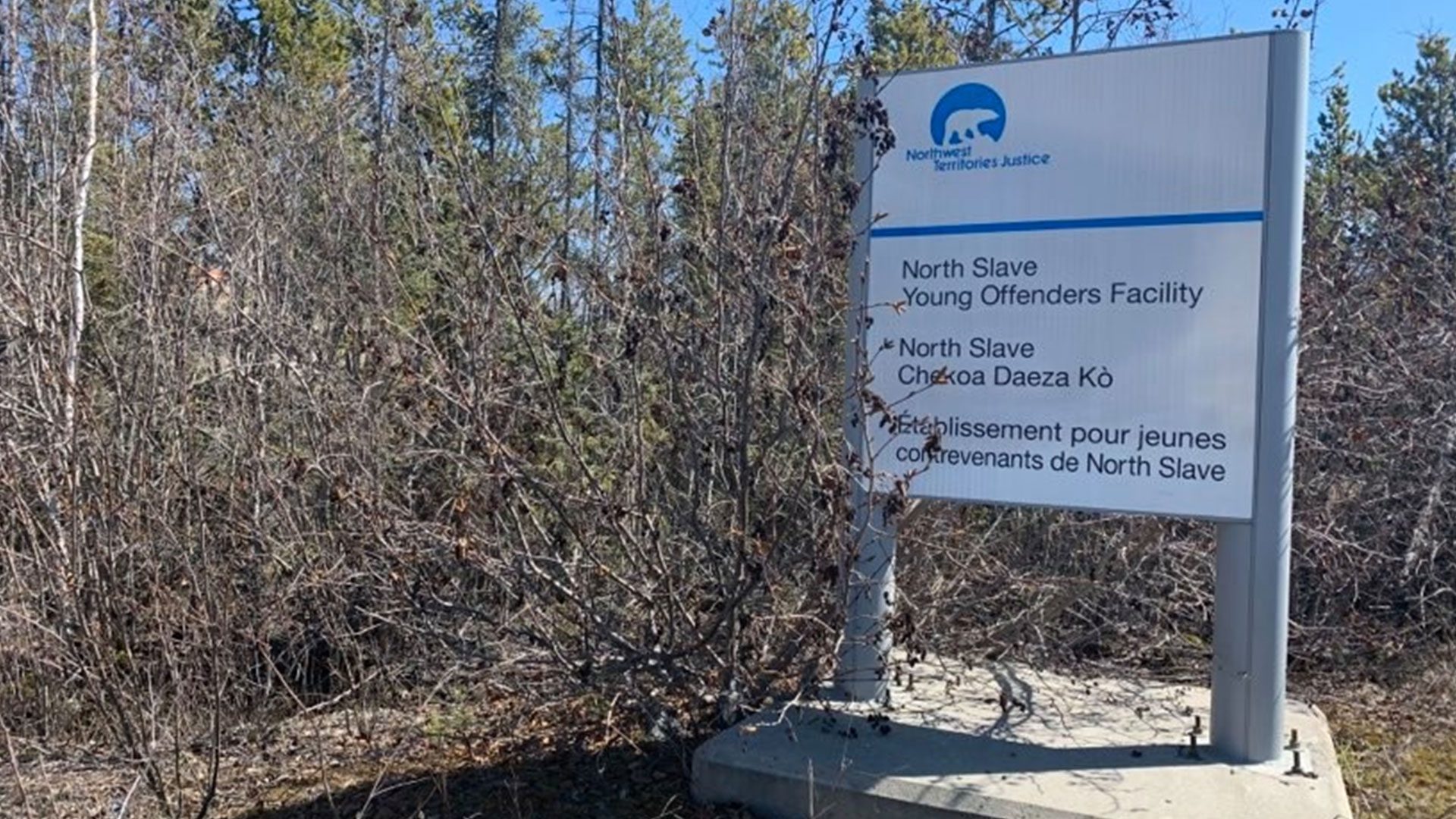
Will Steen says it's hard to be away from family in the Arctic having been released on bail in Yellowknife. Photo: Charlotte Morritt-Jacobs/APTN
Will Steen has spent the last year far from his family in Tuktoyaktuk, N.W.T. after a night of drinking in the dry community landed him bail conditions which prohibit him from returning home.
It’s not uncommon for Steen or some of his family who have been involved with the law to be released on bail in Yellowknife, but the duration of time spent dealing with legal matters seems to get longer with each breach because of N.W.T. court travel policies and COVID-19 restrictions.
Steen faces charges for breach of probation and assault, then assault and mischief when arrested and detailed by RCMP.
“I’ve had a criminal record since I was about 19-years-old, after I was charged with careless storage of a firearm and careless use. My mother and her husband had both died when I was young so the house was closed down and I was jumping around staying with family members. That was 10 years ago, it’s been ups and downs since then,” Steen said.
He was flown from Tuk to Yellowknife in August 2019 and spent a week in the North Slave Correctional Facility. When he was released on his own recognizance, he was under the condition to avoid Tuk until court matters were settled.
But he’s unsure how much longer that will be.
Since the onset of COVID-19 lockdowns in March, both the Supreme Court and Territorial Court have suspended court sittings outside of Yellowknife, with the exception of some cases heard remotely by telephone or videoconference.
“I was supposed to have an appearance date for August 12 in Tuktoyaktuk. I have been waiting a year and a half by the time they try to bring me home for a trial,” he said.
Court processes are nothing new for Steen, his current charges were laid less than two months after he had wrapped up a one-year stint in North Slave Correctional Centre for similar assault and breach of bail offences.
“I got a really long record with mostly breaches of probation because of drinking and stuff. I’m really set up for failure anyways with drinking conditions on bail. I stayed with my grandfather when my parents died who was a heavy drinker because of residential school. That’s where I learned how to drink,” Steen said.
Watch More: Tuktoyaktuk man Will Steen stuck in Yellowknife
His experience mirrors that of many Indigenous people across Turtle Island.
According to the N.W.T. Justice Department, as of June 23 there were 106 adult inmates in the three correctional institutions in the territory, with 86 per cent identifying as Indigenous.
In a scathing 2020 report, Correctional Investigator of Canada Ivan Zinger said Indigenous people account for more than 30 per cent of inmates and experience incarceration six times higher than the national average.
Defense lawyer Peter Harte moved his practice from Ontario to Nunavut and then the N.W.T. 15 years ago, but he still reflects on the shock he felt as he began to represent clients with six-page criminal records.
“For the most part I think I can say that the vast majority of offences on offender criminal records are breaches of one form of another on court order,” Harte said.
The opportunity to get into trouble while awaiting trial is also something Harte sees as individuals from remote communities spend time in the northern hub of Yellowknife with little to do.
“It is likely you are going to know people on the street and you end up chumming around with them, but that really isn’t a very engaging activity. It ends up being a situation where say in a place like Tuk you could be hunting or fishing or finding wood or whatever but here those opportunities to be participating in your community are pretty limited,” he said.
It is not uncommon for those involved in legal issues to be released in Yellowknife with a curfew and to stay at the Salvation Army.
Harte noted that the accommodations without cost leads some Indigenous clients to seek release in Yellowknife.
Steen turned down the option to board at the Salvation Army to avoid temptations with drinking. Instead he landed a job in construction to pay for a tiny room in town and to send money back home to cover the bills for his house in Tuk.
But making ends meet has been challenging.
“I’ve been stressing so much my hair is falling out. I have been struggling to pay the bills ever since my parents died. Dealing with stress and anxiety and depression. Being in a quiet place for days and nights here. I come home after work and there’s no way to spend time with family and be happy,” Steen said.

There’s also been confusion around the Court Services Accused Travel Policy which was updated in January that dealt with what flights courts would pay for when an accused is released from remand.
Harte said in bail court lawyers would seek a condition that their client would be released to reside somewhere other than where the alleged offence took place.
“The challenge that arose recently in January of this year was that the court was only prepared to fly people back to the community they had been arrested in so if you had managed to secure release for your client in Yellowknife, the court would not return him to the community he had been arrested in,” Harte said.
According to Sue Glowach, a communications officer with the Justice Department, further changes to the Court Services Accused Travel Policy were being considered at the onset of public health orders due to COVID-19.
Since March 17, all bail judicial interim release hearings for Territorial Courts have been heard by telephone and some calls taking place remotely from RCMP detachments following arrest.
“This has resulted in judicial interim release hearings being heard sooner in many cases, and has eliminated nearly all travel involving accused persons unless they have been remanded into custody following their judicial release hearing,” Glowach said.
In an email to APTN News the justice department stated that any matter before courts that cannot be heard remotely, whether in Yellowknife or outside of Yellowknife, has been adjourned.
Scheduled court appearances in communities outside of Yellowknife will also be heard by telephone until August 16 with in-person court sittings in all communities after that.










